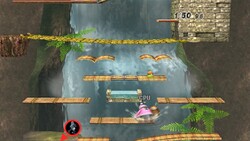Magnifying-Glass Damage: Difference between revisions
No edit summary |
No edit summary |
||
| Line 3: | Line 3: | ||
In ''Melee'', the "hoop" was called the Magnifying Glass, as evidenced by the ''Lost In Space'' [[Bonus points|bonus]]. | In ''Melee'', the "hoop" was called the Magnifying Glass, as evidenced by the ''Lost In Space'' [[Bonus points|bonus]]. | ||
In ''Brawl'', {{SSBB|Meta Knight}} and {{SSBB|Kirby}} have up throws that go beyond the upper blast line, but hoop damage is not taken. | |||
In the [[Subspace Emissary]], if Player 2 is in a situation that would usually trigger hoop damage, they will often instead [[Space Jump]]. | In the [[Subspace Emissary]], if Player 2 is in a situation that would usually trigger hoop damage, they will often instead [[Space Jump]]. | ||
Revision as of 16:53, June 21, 2014
Hoop damage is the damage that a character receives when they are out of the camera's boundaries but not at the blast line. The character is still shown, but only inside a small "hoop" at the edge of the camera boundary. The damage is applied at a rate of 1% per second to prevent players from simply hiding near the blast lines of a stage. Once a character reaches 150%, however, hoop damage stops, meaning that stalling is still possible in Sudden Death. . Hoop damage is present in both Melee and Brawl. It was mentioned on the Smash Bros. DOJO!! on April 14, 2008. Hoop damage occurs in every mode, except for Training Mode.
In Melee, the "hoop" was called the Magnifying Glass, as evidenced by the Lost In Space bonus.
In Brawl, Meta Knight and Kirby have up throws that go beyond the upper blast line, but hoop damage is not taken.
In the Subspace Emissary, if Player 2 is in a situation that would usually trigger hoop damage, they will often instead Space Jump.
Trivia
- In Melee, characters in the Magnifying Glass have a more blocky appearance (akin to graphics of most games for the Nintendo 64), which, when applied to certain characters such as Kirby or Mario, makes them look like they did in the first game.
